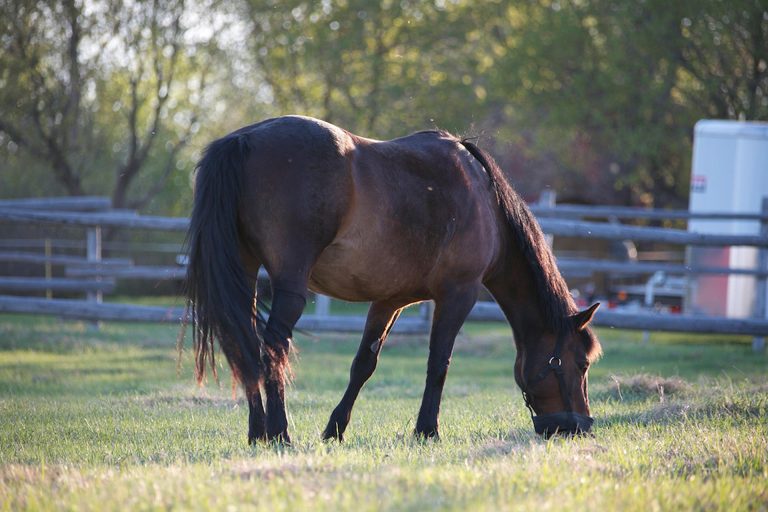Equine gastric ulcers are a common yet undiagnosed issue among horses, especially those subjected to rigorous training or frequent travel. These ulcers occur when the protective lining of the horse’s stomach is compromised, leading to painful sores. Horses with ulcers may exhibit signs like poor appetite, weight loss, changes in behaviour, and a reluctance to perform. It is now recognised that two distinct diseases affect different areas of the stomach: Equine Squamous Gastric Disease (ESGD) and Equine Glandular Gastric Disease (EGGD). Stress, high-starch diets, infrequent feeding, and intense exercise are key contributors to ESGD, and less is known about EGGD.
Horse owners must recognise ulcer symptoms early and seek veterinary advice as soon as possible. Diagnosis can only be confirmed via gastroscopy, where a veterinarian can visually inspect the stomach lining. Treatment often involves medication to reduce stomach acid and promote healing. However, beyond medical intervention, dietary adjustments can play a fundamental role in managing ulcers in horses.
The Role of Alfalfa-Based Feed
Alfalfa-based horse feed offers unique advantages for horses prone to ulcers. Unlike traditional hay, alfalfa is rich in calcium and contains protein with essential amino acids. The high calcium levels in alfalfa are thought to aid in buffering gastric acidity, potentially reducing ulcer severity and recurrence.
Opt for high-quality, dust-free products when selecting alfalfa-based feed for ulcer-prone horses. Dust can irritate the respiratory system, which is not ideal for the performance horse. Pelleted or chopped alfalfa feed is often preferred to reduce wastage and ensure consistent intake. Dietary changes should be made gradually to reduce the risk of digestive upset.
Feeding Management Strategies
Beyond the type of feed, how and when you feed your horse can significantly impact ulcer management. Here are some detailed feeding management strategies to consider:
- Frequent, Small Meals – Instead of large meals, offer smaller portions throughout the day, ideally spaced out every 3-4 hours and ensuring the horse has sufficient forage to keep them going. This approach helps maintain a steady pH in the stomach by continuously stimulating saliva production and buffering gastric acid.
- Hay Before and After Exercise – Providing quality hay before and after exercise may be particularly beneficial for ulcer-prone horses. Hay acts as a buffer in the stomach, forming a protective layer that reduces the impact of acid during physical exertion. For horses who are not greedy with their forage, feeding a Stubbs scoop of chopped fibre feed or alfalfa before exercise can also help to form a fibrous mat to reduce acid splash.
- Consistent Routine – Horses thrive on predictable routines. Establish a regular feeding schedule and stick to it rigorously. Avoid sudden changes or disruptions in feeding times, which can induce stress and exacerbate ulcer symptoms. Consistency supports digestive health, contributes to overall well-being, and reduces stress. Ensuring continuity of their human carer and reviewing any practices in the yard that may be distressing for the horse are also important. Furthermore, it is also recommended to provide at least two rest days per week.
- Access to Forage 24/7 – Ensure your horse has continuous access to forage, such as high-quality grass hay or pasture. This mimics their natural grazing behaviour, encouraging regular eating patterns and saliva production. Access to forage throughout the day helps to buffer stomach acid, reducing the risk of ulcer development or exacerbation. Consider using slow-feed hay nets or grazing muzzles to manage intake and reduce wastage. For good doers or overweight horses, ensure a minimum of 1.5% of their body weight is provided as forage per day (on a dry matter basis).
- Consider Alfalfa Pellets or Cubes in addition to your horse’s hay or haylage –Alfalfa-based pet products provide the benefits of alfalfa, including additional slow-release energy, which can benefit poor doers or those prone to losing weight. Pellets or cubes are convenient, dust-free, and can be soaked before feeding, making them a useful partial forage replacement feed for older horses struggling with longer stemmed forages.
Supplementary Support
In addition to dietary adjustments, certain supplements may effectively complement veterinary treatment for ulcers and management. Digestive aids containing live yeast and prebiotics can promote a healthy gut flora balance, which aids digestion and supports overall gut health. Prebiotics provide the necessary nourishment for beneficial bacteria in the hindgut, supporting digestive wellness.
Furthermore, omega-3 fatty acids offer anti-inflammatory properties that may benefit horses with ulcers. To determine the most suitable supplements for your horse’s individual needs, it’s essential to consult with your veterinarian or an equine nutritionist. They can offer advice based on your horse’s health status, ulcer severity, and specific dietary requirements, ensuring a comprehensive approach to ulcer management that prioritises your horse’s well-being and recovery.
Caring for horses with ulcers requires a comprehensive approach encompassing veterinary care, dietary modifications, and thoughtful management practices. Alfalfa horse feed products, like those available at Dengie, are valuable in this strategy, offering digestive support and nutritional benefits. By understanding the unique needs of ulcer-prone horses and implementing targeted feeding and management strategies, horse owners can promote optimal health and well-being for their equine companions.
